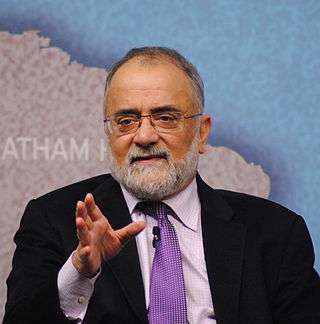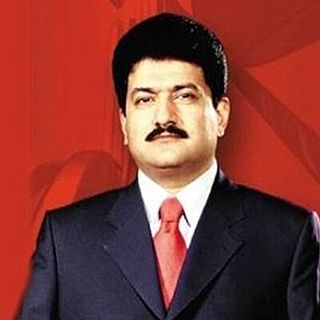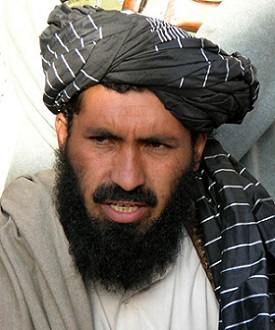Related Research Articles

Muhammad Omar was an Afghan militant leader and founder of the Taliban. During the Third Afghan Civil War, the Taliban fought the Northern Alliance and took control of most of the country, establishing the First Islamic Emirate for which Omar began to serve as Supreme Leader in 1996. Shortly after al-Qaeda carried out the September 11 attacks, the Taliban government was toppled by an American invasion of Afghanistan, prompting Omar to go into hiding. He successfully evaded capture by the American-led coalition before dying in 2013 from tuberculosis.

The Islamic Movement of Uzbekistan was a militant Islamist group formed in 1998 by Islamic ideologue Tahir Yuldashev and former Soviet paratrooper Juma Namangani; both ethnic Uzbeks from the Fergana Valley. Its original objective was to overthrow President Islam Karimov of Uzbekistan and create an Islamic state under Sharia; however, in subsequent years, it reinvented itself as an ally of Al-Qaeda. The group also maintained relations with Afghan Taliban in 1990s. However, later on, relations between the Afghan Taliban and the IMU started declining.

Ahmed Rashid is a Pakistani journalist and best-selling foreign policy author of several books about Afghanistan, Pakistan, and Central Asia.
Wakil Ahmad Muttawakil Abdul Ghaffar is an Afghan politician. He was the last Foreign Minister in the Taliban government of the first Islamic Emirate of Afghanistan in 2001. Prior to this, he served as spokesman and secretary to Mullah Mohammed Omar, leader of the Taliban. After the Northern Alliance, accompanied by U.S. and British forces, ousted the regime, Muttawakil surrendered in Kandahar to government troops.

Hamid Mir is a Pakistani journalist, columnist and writer. Mir initially worked as a journalist with Pakistani newspapers. He has hosted the political talk show Capital Talk on Geo News intermittently since 2002. He writes columns for Urdu as well as English newspapers, both national and international. He has been a contributor to the Global Opinions section of The Washington Post since June 2021. He is well known for his stance against the dominance of the Establishment in Pakistan. Having survived two assassination attempts, Mir has been banned from television three times, and has lost his job twice due to his stand for press freedom and human rights.

Jalaluddin Haqqani was an Afghan insurgent commander who founded the Haqqani network, an insurgent group fighting in guerilla warfare against US-led NATO forces and the now former government of Afghanistan they support.

The 1996–2001 Afghan Civil War, also known as the Third Afghan Civil War, took place between the Taliban's conquest of Kabul and their establishing of the Islamic Emirate of Afghanistan on 27 September 1996, and the US and UK invasion of Afghanistan on 7 October 2001: a period that was part of the Afghan Civil War that had started in 1989, and also part of the war in Afghanistan that had started in 1978.
Hazrat Ali is an Afghan politician and former military leader. He previously served as a military commander for the Northern Alliance in eastern Afghanistan.
Fazal Hayat (1974 – 15
Tariq Azizuddin was Pakistan's ambassador to Turkey. He was ambassador to Afghanistan when he was taken hostage by terrorists from the Tehrik-i-Taliban on Monday February 11, 2008. Tariq was traveling, by road, from his home in Peshawar, to Afghanistan's nearby capital, Kabul. His vehicle was stopped by gunmen and he was taken hostage along with his driver Gul Nawaz and bodyguard Amir Sultan in Pakistan's Khyber Tribal Agency, prior to passing through the border crossing at Torkham.

The Pakistani Taliban, formally called the Tehreek-e-Taliban-e-Pakistan, is an umbrella organization of various Islamist armed militant groups operating along the Afghan–Pakistani border. Formed in 2007 by Baitullah Mehsud, its current leader is Noor Wali Mehsud, who has publicly pledged allegiance to the Afghan Taliban. The Pakistani Taliban share a common ideology with the Afghan Taliban and have assisted them in the 2001–2021 war, but the two groups have separate operation and command structures.

The War in Afghanistan was an armed conflict from 2001 to 2021. It was the direct response to the September 11 attacks. It began when an international military coalition led by the United States launched an invasion of Afghanistan, declaring Operation Enduring Freedom as part of the earlier-declared war on terror; toppling the Taliban-ruled Islamic Emirate and establishing the Islamic Republic three years later. The Taliban and its allies were expelled from major population centers by the US-led forces, supporting the anti-Taliban Northern Alliance; however Bin Laden relocated to neighboring Pakistan. The conflict officially ended with the 2021 Taliban offensive, which overthrew the Islamic Republic, and re-established the Islamic Emirate. It was the longest war in the military history of the United States, surpassing the length of the Vietnam War (1955–1975) by approximately six months.
Pakistan and state-sponsored terrorism refers to the involvement of Pakistan in terrorism through the backing of various designated terrorist organizations. Pakistan has been frequently accused by various countries, including its neighbours Afghanistan, Iran, and India, as well as by the United States, the United Kingdom, Germany, and France, of involvement in a variety of terrorist activities in both its local region of South Asia and beyond. Pakistan's northwestern tribal regions along the Afghanistan–Pakistan border have been described as an effective safe haven for terrorists by Western media and the United States Secretary of Defense, while India has accused Pakistan of perpetuating the insurgency in Jammu and Kashmir by providing financial support and armaments to militant groups, as well as by sending state-trained terrorists across the Line of Control and de jure India–Pakistan border to launch attacks in Indian-administered Kashmir and India proper, respectively. According to an analysis published by the Saban Center for Middle East Policy at the Brookings Institution in 2008, Pakistan was reportedly, "with the possible exception of Iran, perhaps the world's most active sponsor of terrorist groups... aiding these groups that pose a direct threat to the United States. Pakistan's active participation has caused thousands of deaths in the region; all these years Pakistan has been supportive to several terrorist groups despite several stern warnings from the international community." Daniel Byman, a professor and senior analyst of terrorism and security at the Center For Middle East Policy, also wrote that, "Pakistan is probably 2008's most active sponsor of terrorism". In 2018, the former Prime Minister of Pakistan, Nawaz Sharif, suggested that the Pakistani government played a role in the 2008 Mumbai attacks that were carried out by Lashkar-e-Taiba, a Pakistan-based Islamist terrorist group. In July 2019, Pakistani Prime Minister Imran Khan, on an official visit to the United States, acknowledged the presence of some 30,000–40,000 armed terrorists operating on Pakistani soil. He further stated that previous administrations were hiding this truth, particularly from the United States, for the last 15 years during the War on Terror.

Maulvi Nazir was a leading militant of the Pakistani Taliban in South Waziristan. Nazir's operations were based in Wana.
For purposes of U.S. foreign policy, South Asia consists of Afghanistan, Bangladesh, Bhutan, India, the Maldives, Nepal, Pakistan, and Sri Lanka. The Assistant Secretary of State for South and Central Asian Affairs was Nisha Desai Biswal.
Ilyas Kashmiri, also referred to as Maulana Ilyas Kashmiri, Mufti Ilyas Kashmiri and Muhammad Ilyas Kashmiri, was a Pakistani ex-Special Forces Islamist guerrilla insurgent who fought against Indian troops in Kashmir.
Pakistan's role in the War on Terror is a widely discussed topic among policy-makers of various countries, political analysts and international delegates around the world. Pakistan has simultaneously received allegations of harbouring and aiding terrorists and commendation for its anti-terror efforts. Since 2001, the country has also hosted millions of Afghan refugees who fled the war in Afghanistan.
The Battle of Kandahar was an attack by Taliban forces on May 7, 2011, in the city of Kandahar. The battle was the biggest Taliban offensive of 2011, marking over 40 total deaths and over 50 total wounded. The fighting demonstrated that, despite heavy losses since 2001, the Taliban forces remain a threat to coalition and Afghan forces, and show that morale in insurgent groups has not died since the killing of Osama bin Laden.
Abdul Rauf is a Pakistani Deobandi fundamentalist Islamist militant commander of the Jaish-e-Mohammed (JeM), a Deobandi Islamist militant organization which has carried out Islamist militant activities in India & Afghanistan under the support of Pakistan's main intelligence agency.
The Taliban is a militant Islamist organisation, which has ruled Afghanistan under a theocratic emirate several times in the last 30 years. In August 2021, the Taliban took control of the country, and subsequently established a new government, thus completely succeeding the former. As of late 2022, no country recognizes them as the lawful government of Afghanistan; however, there has been limited recognition of their de facto governance over the country.
References
- 1 2 3 4 Syed Saleem Shahzad (20 May 2008). "Pakistani militants savor a sweet deal". Asia Times. Archived from the original on 4 July 2008. Retrieved 20 May 2008.
{{cite news}}: CS1 maint: unfit URL (link) - ↑ "U.S. jets hit suspected bin Laden camp" (PDF). Colby Free Press. 15 October 2001. Archived from the original (PDF) on 19 May 2011. Retrieved 17 May 2008.
- ↑ "Pakistani ambassador goes missing". BBC News. 11 February 2008. Retrieved 19 May 2008.
- ↑ "Pak envoy to Afghanistan goes missing: Believed to have been abducted in Khyber Agency". Pak Tribune. 12 February 2008. Retrieved 19 May 2008.
- 1 2 "Kidnapped ambassador freed: Taliban claim Mulla Obaidullah, others swapped for Tariq Azizuddin; govt denies deal". Pak Tribune. 18 May 2008. Retrieved 19 May 2008.
- ↑ "Afghans free foreign contractors". BBC News. 18 May 2008. Retrieved 19 May 2008.